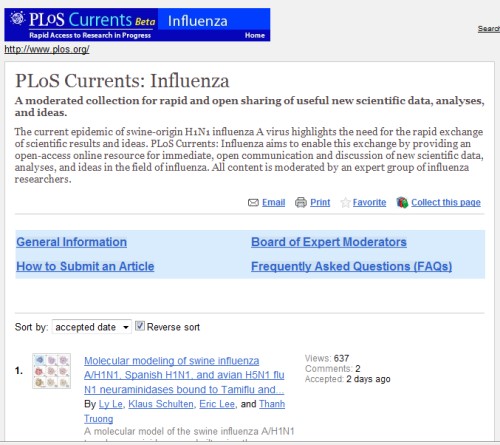September 1, 2009
PLoS Currents: Influenza, revolutionizing the way on how we deal with a pandemic
PLoS, Public Library of Science, has just announced PLoS Currents: Influenza. It is a partnership among NCBI (National Center for Biotechnology Information), Google and PLoS, a blog structure hosted by Google Knol. It is a kind of blog and wiki, a site nurtured by content produced by the users but assessed by qualified moderators. In this case the leaders are Eddie Holmes (Center for Infectious Disease Dynamics, Pennsylvania State University) and Peter Palese (Department of Microbiology, Mount Sinai School of Medicine), both of them renowned researchers in the area.
All this is done with the aid of a database in NCBI, the Rapid Research Notes that will allow for articles citation in papers. This is the end of the need to hide interesting data while preparing a manuscript, once its author canbe cited and have his/her work recognized, a constant and important concern in areas with high competition. All the content will be open access, thus giving everyone the chance to use the information.
In a quick evolving scientific field like the research with the new Influenza H1N1, which is constantly nurtured by data and analysis, communication has to be fast. The traditional publication mode, with the writing of an article, its submission to a journal and review by other researchers delays the content production in reasonable time. In the format of a blog, the authors may post the results quickly, which are approved or not by the moderators and discussed by the scientific community before they are joined together and published in a regular journal.
Although PLoS Currents: Influenza starts with the concept of discussing data related to the recent epidemics with Influenza A H1N1, mentioned in the blog as H1N1pdm, it will deal with all kinds of influenza, as well as with any aspect related to the virus.
Very important articles about the first data on the swine H1N1 have already been published as open access and without any restriction from the press that usually takes a week. Even journals that are traditionally restricted to subscribers like Nature and Science, considered among the most important journals all over the world, had to open exceptions when publishing articles about the new epidemics.
Although Rapid Research Notes has just been created in order to host the PLoS initiative, it has already been designed to be expanded to other areas that require quick publication of results. Some requirements are: experts’ moderation, quick content approval and liberation under Creative Commons’ license. It seems that a new area of publications is appearing, in the mode of open access.
For further information consult PLoS Currents: Influenza most frequently asked questions.
No Comments » Posted in: Publication


